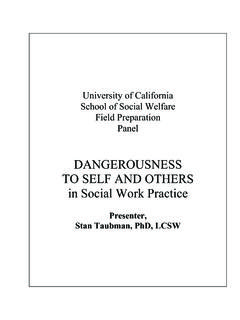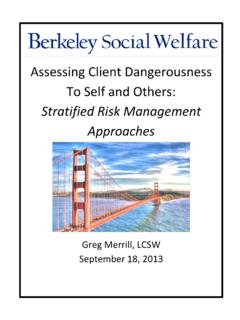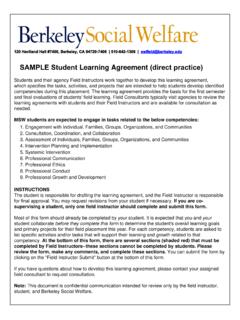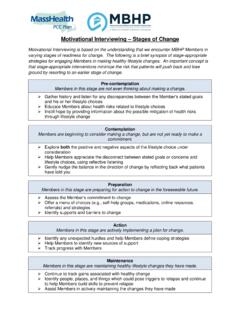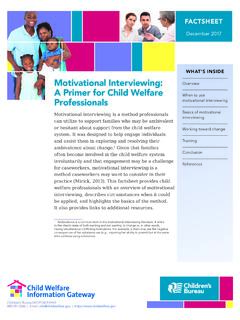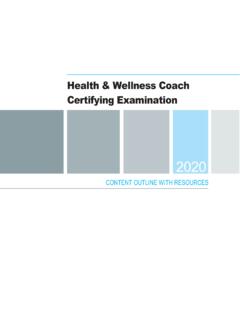Transcription of MOTIVATIONAL INTERVIEWING: HELPING PEOPLE CHANGE
1 MOTIVATIONAL interviewing : HELPING PEOPLE CHANGE . Introductory Level Greg Merrill, LCSW. Berkeley Social Welfare Welcome to MOTIVATIONAL interviewing : HELPING PEOPLE CHANGE What PEOPLE really need is a good listening to. -- Mary Lou Casey COURSE DESCRIPTION. MOTIVATIONAL interviewing (MI) is a modern clinical paradigm that dialectically integrates humanistic, client-centered principles with goal-focused strategies. MI seeks to explore, clarify, and if relevant, strengthen client motivation for a specific goal by: 1) creating an interpersonal atmosphere of acceptance, compassion, and hope; 2) identifying and exploring the client's own, intrinsic subjective reasons and factors for deciding if, what, when, and how to CHANGE ; 3). attending and responding strategically to the client's language related to CHANGE ; and 4). improving the client's confidence and/or ability to influence factors within his or her control. Considered an evidence-based practice for treating substance abuse, MI is now being tested in health, mental health, forensic, and child welfare settings where it appears to be a promising practice.
2 A flexible and portable method, it can be applied in 5-20 minute segments, in a single session, or over the course of multi-session psychotherapy. Moreover, it blends nicely with other interventions commonly employed by social workers such as case management, supportive psychotherapy, cognitive-behavioral therapy, and trauma-focused therapy. In this 6-hour introductory class, students will be introduced to key aspects of MOTIVATIONAL interviewing including its underlying spirit (acceptance, compassion, and evocation) and primary tenets. The primary skill components emphasized will be open-ended questions, affirmations, reflections, and summaries (OARS). COURSE OBJECTIVES. On completing this course, students will be able to: 1. Describe and define MOTIVATIONAL interviewing and compare and contrast it to other counseling techniques;. 2. Understand the conditions under which most clients are willing to attempt behavioral CHANGE (the CHANGE trifecta: importance, confidence, readiness).
3 3. Describe elements of the provider style that precontemplative or highly ambivalent clients appear to respond most favorably to;. 4. Demonstrate beginning proficiency with core client-centered counseling skills including asking open-ended questions, affirming, reflecting, and summarizing (OARS);. 5. To understand that it is the provider's job to create the relational conditions and guide the conversation so that the client can reflect upon his/her circumstance and decide if, when, and how she or he would like to CHANGE . 2. TIMED AGENDA. DAY ONE. 9:00-10:00 Overview of the Training Why PEOPLE CHANGE Precontemplative and Ambivalent Clients 10-11:00 A Taste of MOTIVATIONAL interviewing : The Spirit 11:00-11:15 BREAK. 11:15-12:00 Client Centered, Opening Micro-Skills: OARS in Water Open-Ended Questions (50-70%). Affirmations Reflections (2:1). Summaries 12:00 12:45 LUNCH BREAK. 1:00-2:30 Client-Centered, Opening Micro-Skills: OARS in Water 2:30-2:45 BREAK.
4 2:45-4:20 Client Centered, Opening Micro-Skills: continued .. 4:30 Evaluation of Day 3. 4. The CHANGE Trifecta READINESS. (the right time, the right way). IMPORTANCE CONFIDENCE. (willing) (able). 5. 6. THE TRANSTHEORETICAL MODEL: STAGES OF CHANGE . Stage Quote Essential Features Provider Strategies Client does not recognize the problem; is unaware or Precontemplation underaware of the extent of the Problem? What problem; denies, minimizes, Problem? rationalizes, and displaces blame and responsibility; has conflictual conversations with family, friends, and providers about this area; has no immediate intention of changing but may be thinking about it more than lets on. Client struggles with whether or not the problem is real and Contemplation There may be a significant, whether to address problem. it, and whether he/she is willing and able to do what it would take to address it; becomes aware of the problem, willing to discuss and consider but not ready yet to take action and does not generally like to feel rushed, pressured, or coerced.
5 Client is willing to admit there is Preparation I'm getting a problem and gets ready to do ready to deal. something about it. Client actively sets about Action I'm dealing. changing their behavior, environment, and patterns, requiring considerable energy and devotion. The client works to maintain the Maintenance I'm continuing changes so that the problem to deal. does not recur. Relapse The client reverts back Oops, I did it temporarily to behaviors and again. environment that constituted the original problem. Prochaska, , DiClemente, , & Norcross, (1992). In search of how PEOPLE CHANGE : Applications to Addictive Behaviors. American Psychologist, 47(9), 1102-1114. 7. Clinician Style Influences Motivation Level Inquisitive, Curious Affirming Genuine Accepting Interested Collaborative Emphasizes Choice Draws out Client View MOTIVATION. Draws premature conclusions Coerces, Pressures Rushes, Panics Judges, Prescribes Confronts, Labels Fixes, Overadvises Uninterested in client's perspective 8.
6 9. 10. 11. 12. CONVERT THESE TO OPEN-ENDED QUESTIONS. 1. What is the last grade in school that you were able to complete? 2. How many cigarettes do you smoke per day? 3. Have you ever had a sexually transmitted infection or an abortion? 4. Don't you think it would be a good idea to stop smoking cigarettes? 5. In the last week, how many alcoholic drinks have you had? 6. Did anyone in your family growing up have a mental illness? 7. When is the last time you were tested for HIV? 8. Do you physically discipline your child? 9. Have you ever witnessed or experienced yourself a life-threatening accident or physical or sexual assault? 10. Have you ever been incarcerated? 11. Have you felt sad, lifeless, or exhausted most of the day every day for the last two weeks? 12. Do you carry a gun or a knife on you? 13. Have you paid your rent this month? 14. Do you have enough access to food? 15. Are you thinking about harming yourself or others? 13. 14. 15.
7 YOUR REFLECTIONS, PLEASE -- Literally Instructions: Below you will find a sample of statements made by a range of clients. In this exercise, you are to withhold all advice and questions. You may only respond with brief reflective statements followed by a pregnant pause. Think deeply: what is this client really trying to say . what is their underlying meaning here? Then generate as many reflections as you can and feel free to take creative risks. Adolescents/Young Adults 1. "I don't care what I do with myself. I just want to do nothing when I 'grow up.'". 2. I can't do better in school because the teachers and principal already hate me.. 3. It is not my fault. The bus was late and the guy that interviewed me told me that stuff I would do at the job sounded like I would be a slave.. 4. What's the point of learning to read and write when I'm only going to die and get shot tomorrow? I won't even make it to 17, you watch.. 16. 5. You know, I'm just doing my thing right now until it's played out.
8 Then I'll go straight and settle down.. 6. I'm not going to work some stupid job at Carl's Jr., making minimum wage. I. make a lot more doing what I am doing now.. 7. You haven't gotten me my housing yet or a job.. 8. My parents used [drugs and alcohol] throughout my childhood. Why can't I? . 9. Those squares go and work those minimum wage jobs. I make great money selling dime bags, and pot should be legal anyway.. 17. Mental Health 12. Everybody's pressuring me to get a payee but there is no way in Hell that's going to happen.. 13. I don't have a gambling problem. I just like to gamble a little too much sometimes.. 14. I think the building manager is blowing this incident out of control. All I did is cuss out the front desk person, and everyone knows she's a fucking idiot.. 15. I'm not going to a homeless shelter ever. Those places are nasty and I'm better off in the park.. 16. The last care manager I had was useless. She never even returned my calls, she didn't help me with SSI, and all she wanted to do was talk about my feelings.
9 ' . 17. Talking, taking pills, these things are boring, and they don't help me. They depress me.. 18. 18. My dog is the only living thing I care about, and she loves me, too. PEOPLE think that's weird but I don't care. She's better than any human as far as I. can tell.. 19. I've had a miserable life from start to finish. And I just want to die. If I get evicted, I'll kill myself. I'm not going to be homeless.. 20. I like spending a couple weeks in the hospital. It's like taking a vacation from my life.. 21. All you PEOPLE want to know is if I took my medication. Did you take yours? . 22. The CIA have bugged my room and my cell phone and the Blackhawk helicopters follow me everywhere.. 23. I don't slit my wrists to kill myself. I just do it to feel something, and I kind of like watching the blood starting to drip out.. 19. 24. The gay PEOPLE have it out for me in this town. They are trying to make a sexual slave out of me.. Birth Parent Statements 10.
10 I just used crack the one time. It was just one little time. I just needed to see if I could walk away from it again, and I did. It's done.. 11. He didn't mean to get so mad. He's a good guy. He was just high. If anything, I'm the one who started it.. 25. I can raise my child anyway I want. Children need discipline, and I am strict. And you got a problem with that? . 26. I'm a good parent. I love my kids.. 27. The reason my test came back positive was because I had the flu and took flu medication. The test must have picked that up by accident.. 20. 28. I was at this party and somebody spiked my drink. That's the only reason I. can think of why my test was positive.. 29. I've called those PEOPLE several times, and they never get back to me. What else can I do? . 30. The reason the house is such a mess is because we just moved in and I've been sick so I haven't had time to clean it up yet.. 31. The real problem is the economy. There are no jobs, and if I could just find a job, everything would be fine.
